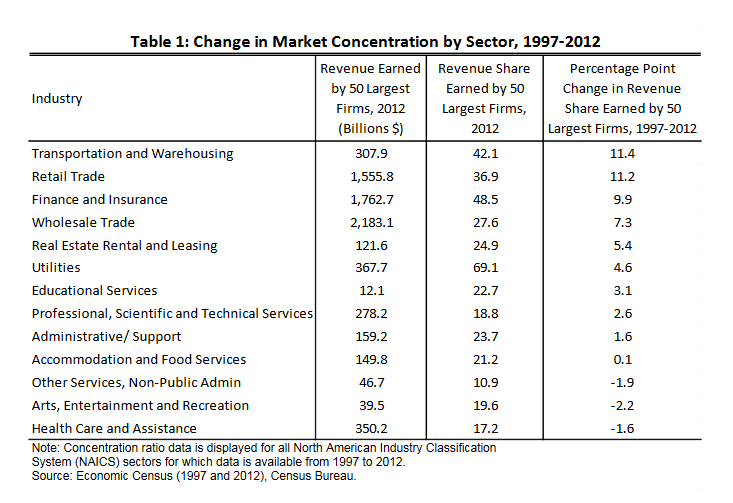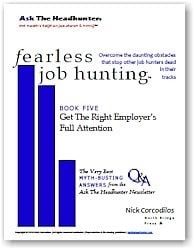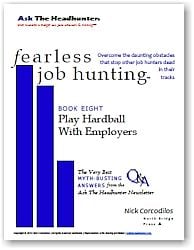Question
I read that Massachusetts made it illegal for employers to require your salary history when you apply for a job. I always thought this was wrong to begin with. It’s how companies “justify” low-ball salary offers. This seems to back up what you’ve been saying all along — but what about those of us who don’t work in Massachusetts?
Nick’s Reply
I told you so.
Job applicants have been getting screwed by HR departments since time immemorial through intimidation and badgering:
“We can’t proceed with your application until you tell us what you’re getting paid now. It’s the policy!”
This is a popular topic on Ask The Headhunter, and I advise people to just say NO. (See Salary History: Can you afford to say NO? and Keep Your Salary Under Wraps.) When employers demand to know your salary, it’s for just one reason: to low-ball any offer they make you.
And now everybody knows it.
It’s illegal to threaten job applicants
The state of Massachusetts just passed a law: Illegal in Massachusetts: Asking Your Salary in a Job Interview (New York Times). No longer will HR threaten to “end the application process” if you won’t tell your salary.
The dirty little secret is out:
“Companies tend to set salaries for new hires using their previous pay as a base line… which often leaves applicants with the nagging suspicion that they might have been offered more money if the earlier figure had been higher.”
Duh.
The impetus behind this new law is to end pay disparity between men and women. (See Don’t blame women for the gender pay gap!) But the problem is much, much bigger.
Employers are the dummies
When employers make job interviews dependent on disclosing your old salary, everyone gets hurt — men and women. Even dopey employers get hurt, because their silly insistence elicits guffaws and “Screw you!” from the best job seekers, who won’t be intimidated and won’t give away their negotiating edge.
The New York Times points out — duh — that:
“The new law will require hiring managers to state a compensation figure upfront — based on what an applicant’s worth is to the company, rather than on what he or she made in a previous position.”
Read the boldface again. Employers will have to figure out what you’re worth.
Jeez. What a concept for a business! What an indictment of the stupid employment system that HR departments have propped up for decades.
No competitive edge
Employers who base job offers on what another employer paid you are admitting five things:
- They really, really believe people (workers) are fungible — interchangeable parts.
- They’re incapable of assessing your value to their own business.
- They’re willing to judge you based on what one of their business competitors came up with.
- They believe your worth to one employer is the same as your worth to any employer.
- They have no competitive edge on judging value.
This new law is good for employers because it will force them to hire smarter and to be more competitive. Of course, they may need to fire their HR departments and whip their managers into shape. It’s time for employers to figure out how any new hire will contribute to the bottom line.
Jeez. What a concept.
Kudos to Massachusetts for being the first state to outlaw salary intimidation in job applications and interviews. I think the rest of the nation will soon follow.
 Just say NO
Just say NO
If you don’t live and work in Massachusetts, you still can and should say NO when employers demand your current salary. Smart employers will back off. The rest aren’t worth a job interview, because if they don’t take advantage of you up front, they’ll do it later.
Ask The Headhunter subscribers have been saying NO — politely, firmly and successfully — for a long time:
“The hiring manager more or less offered me the position on the spot and indicated a salary range that is roughly 40-50% more than I make now. Your two biggest lessons (at least for me) at work in the flesh: (1) Never divulge my current salary, and (2) Talk about what I will do, not what I’ve done.” -Rich Mok
“Despite both the headhunter and the company insisting I disclose what I was getting paid at my old job, I stuck to my guns and I was able to double my salary. Plus I got a signing bonus. That would have never happened in a million years if I had caved!” – Bernie Dietz
“I was headhunted for a lucrative job at another company and, following your advice, did not state my current salary, nor did I even hint at its range. Thanks to your book, Keep Your Salary Under Wraps, I ended up with a 40% increase on my previous job and salary! Thanks!” – Daniel Slate
Say goodbye to low-ball salary offers — at least those based on your old salary. Employers can still low-ball you. And the best way to avoid that is to be prepared to show why you’d be the most profitable hire. Don’t be a dummy yourself. See How do I prove I deserve a higher job offer?
: :


 We recently got a look at machines doing interviews — automated hiring. (
We recently got a look at machines doing interviews — automated hiring. ( In engineering, it’s called a signal-and-noise problem. The point is to identify the signal before noise seeps into the system and obscures it. HR and robo-hiring vendors (“HR technology”) introduce more and more pre-processing into recruiting and hiring — and that adds noise. The best candidates — the signals — get lost or rejected long before any hiring manager gets to judge them properly. Managers can’t hear the best candidates.
In engineering, it’s called a signal-and-noise problem. The point is to identify the signal before noise seeps into the system and obscures it. HR and robo-hiring vendors (“HR technology”) introduce more and more pre-processing into recruiting and hiring — and that adds noise. The best candidates — the signals — get lost or rejected long before any hiring manager gets to judge them properly. Managers can’t hear the best candidates. In
In  I saw a disturbing story on Bloomberg:
I saw a disturbing story on Bloomberg:  It seems not to occur to the Goldman Sachs of the world that they can’t find talent because they’re not looking for talent. It’s the proverbial story of washing your hands with rubber gloves on. It’s surrogate interviewing. Outsourced hiring. To use another metaphor, rather than going out to meet the talent, Goldman Sachs is sending a robo-dog named HireVue with a note in its mouth. Machine interviewing.
It seems not to occur to the Goldman Sachs of the world that they can’t find talent because they’re not looking for talent. It’s the proverbial story of washing your hands with rubber gloves on. It’s surrogate interviewing. Outsourced hiring. To use another metaphor, rather than going out to meet the talent, Goldman Sachs is sending a robo-dog named HireVue with a note in its mouth. Machine interviewing. I’ve got an idea to make it easier on graduates.
I’ve got an idea to make it easier on graduates. Reader 1: Back in the 20th century, employers actually reviewed resumes by reading them rather than scanning them into a computerized ranking system. Keywords have turned hiring into a pass-the-buck game, with HR complaining it can’t find talent! Well, HR isn’t looking for talent. HR isn’t looking for anything. Phony algorithms are keeping the talent unemployed while HR gets paid to do something else! The question is, what is HR doing?
Reader 1: Back in the 20th century, employers actually reviewed resumes by reading them rather than scanning them into a computerized ranking system. Keywords have turned hiring into a pass-the-buck game, with HR complaining it can’t find talent! Well, HR isn’t looking for talent. HR isn’t looking for anything. Phony algorithms are keeping the talent unemployed while HR gets paid to do something else! The question is, what is HR doing? Budget problems may impact hiring and internal promotions, but it’s HR’s job to make sure all the i’s are dotted and the t’s are crossed before HR makes offers that impact people’s lives. Don’t make job offers if you don’t have the authority to follow through. If your company doesn’t give you that authority, then quit your job because you look like an idiot for having a job you’re not allowed to do. What happens to every job applicant is on you. (See
Budget problems may impact hiring and internal promotions, but it’s HR’s job to make sure all the i’s are dotted and the t’s are crossed before HR makes offers that impact people’s lives. Don’t make job offers if you don’t have the authority to follow through. If your company doesn’t give you that authority, then quit your job because you look like an idiot for having a job you’re not allowed to do. What happens to every job applicant is on you. (See  The job of recruiting is about identifying and enticing the right candidates for jobs at your company. It’s not about soliciting everyone who has an e-mail address, and then complaining your applicants are unqualified or unskilled. You can’t fish with a bucket.
The job of recruiting is about identifying and enticing the right candidates for jobs at your company. It’s not about soliciting everyone who has an e-mail address, and then complaining your applicants are unqualified or unskilled. You can’t fish with a bucket. I have a standing challenge to anyone in HR: Give me one good reason why you need to know how much money a job applicant is making. No HR worker has ever been able to explain it rationally.
I have a standing challenge to anyone in HR: Give me one good reason why you need to know how much money a job applicant is making. No HR worker has ever been able to explain it rationally. part of the workforce), there’s plenty of talent out there to fill the 5.6 million vacant jobs in America. (See
part of the workforce), there’s plenty of talent out there to fill the 5.6 million vacant jobs in America. (See  I can understand why companies want and need non-competes and NDAs, but I feel signing such contracts limits my future job opportunities; at least the ones that would pay me the most. So, I could refuse to sign, and they can refuse to hire me. If I want the job, it seems I’ve gotta bite the bullet. Perhaps I could sign the contract as “Darth Vader” and they won’t notice.
I can understand why companies want and need non-competes and NDAs, but I feel signing such contracts limits my future job opportunities; at least the ones that would pay me the most. So, I could refuse to sign, and they can refuse to hire me. If I want the job, it seems I’ve gotta bite the bullet. Perhaps I could sign the contract as “Darth Vader” and they won’t notice. A banker’s story
A banker’s story


 “If you are intelligent enough you will find that I’m everything you’re looking for and more. If you are not, then keep on looking…”
“If you are intelligent enough you will find that I’m everything you’re looking for and more. If you are not, then keep on looking…” With the job market being more favorable to employers, they suggest that getting into the dialog too early can remove you from consideration quickly. While none of us wants to waste time going through the motions only to discover the salary may be too low, it may be more important to stay in the game as long as you can, getting them to like you. It gives you more of an opportunity to sell yourself, too.
With the job market being more favorable to employers, they suggest that getting into the dialog too early can remove you from consideration quickly. While none of us wants to waste time going through the motions only to discover the salary may be too low, it may be more important to stay in the game as long as you can, getting them to like you. It gives you more of an opportunity to sell yourself, too. If you think trying to be likeable and saying “I’m sure you’ll be fair” will help you “stay in the game” longer, you’re going to lose because the employer will take advantage of the fact that you invested all that time — and correctly surmise that you’re going to take whatever they offer you. This is one of the oldest psychological tricks used in negotiating — look up cognitive dissonance. People have a tendency to rationalize and accept lousy job offers because they’ve spent so many hours in interviews.
If you think trying to be likeable and saying “I’m sure you’ll be fair” will help you “stay in the game” longer, you’re going to lose because the employer will take advantage of the fact that you invested all that time — and correctly surmise that you’re going to take whatever they offer you. This is one of the oldest psychological tricks used in negotiating — look up cognitive dissonance. People have a tendency to rationalize and accept lousy job offers because they’ve spent so many hours in interviews. I recently got a very nice thank-you note from an applicant to whom I had sent a no-thank-you — that is, a rejection letter. She seemed surprised to hear from me. As a manager, it has always been my practice to reply to every applicant either by letter or e-mail. I’ve been criticized for the time it takes. However, I believe that if someone takes the time to express interest in your company, the least you can do is tell them “no, thank you” if you don’t want them.
I recently got a very nice thank-you note from an applicant to whom I had sent a no-thank-you — that is, a rejection letter. She seemed surprised to hear from me. As a manager, it has always been my practice to reply to every applicant either by letter or e-mail. I’ve been criticized for the time it takes. However, I believe that if someone takes the time to express interest in your company, the least you can do is tell them “no, thank you” if you don’t want them. It’s easy to be rude to a resume; but you can’t hire resumes. Top-notch workers in your field will not stand for rudeness. Talk to all the people you pissed off when you ignored their applications, and you will learn what rude is. Rude is awakening to find your company’s professional reputation has been trashed by good applicants who found out you’re not as good as they are. (See
It’s easy to be rude to a resume; but you can’t hire resumes. Top-notch workers in your field will not stand for rudeness. Talk to all the people you pissed off when you ignored their applications, and you will learn what rude is. Rude is awakening to find your company’s professional reputation has been trashed by good applicants who found out you’re not as good as they are. (See